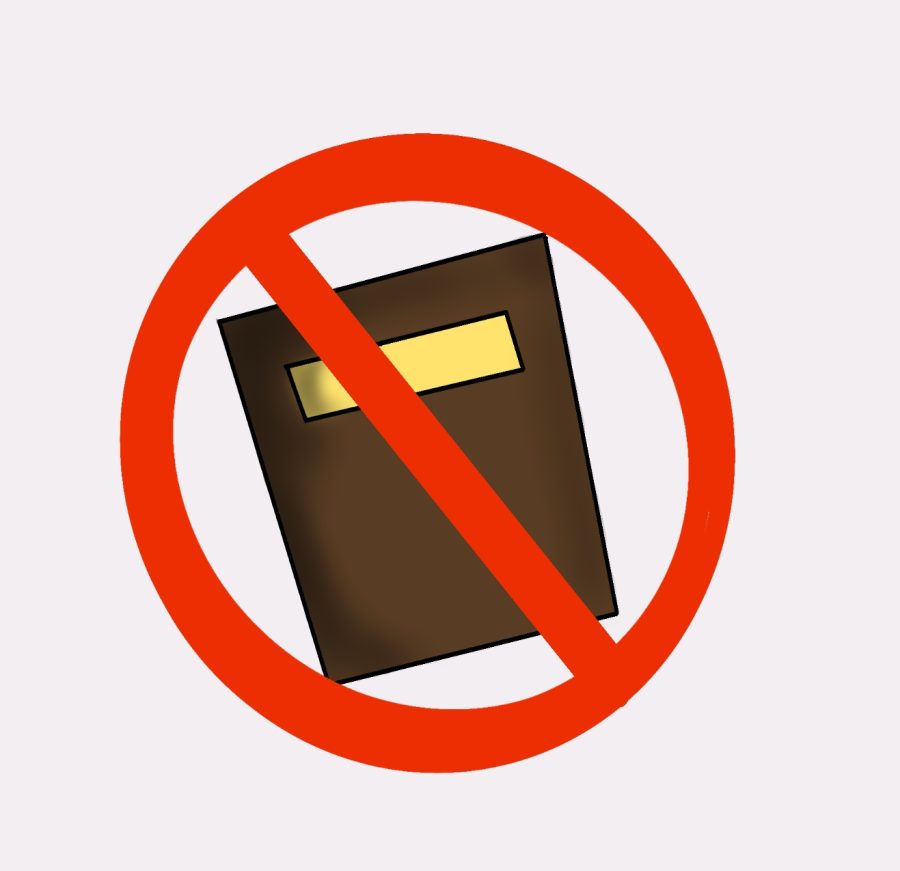Photo Credit: Art By Jasmine Bezotte
Banning Books Leads To Cheating Students
In early July of 2021 Banning books by school districts started to become highly popular all across the united states. And by March 31st 2022, a total of 1,145 books had been permanently banned all over the United States.
“Banning books is a negative thing because banning books will limit children’s worldviews and will not introduce them to any topics that could be labeled “controversial,” such as LGBTQ+ issues”. Senior Harrison Hollingsworth said.
Students state that they deserve access to information and without having access to certain information it can have negative effects on future students.
“Banning books will make them less knowledgeable about numerous different subjects,” Hollingsworth said.
Crystal Hodgens, who has been an English teacher for 22 years, is against the book ban. She agrees that school districts banning books will have negative effects on students.
“For some students, school is the only place where students have access to books. Not everyone can afford books, not everyone has books in their homes. Schools are meant to be an equalizer in terms of access to education. Banning books restricts this access.” Hodgens said.
Hodgens says that banning books in school will not only affect students but could possibly affect chosen materials. Legally students have a right to all information so banning books violates their basic right to access of information which has already been proven by the Supreme Court.
“Yes it does, schools are meant to inform students on a large number of subjects from every viewpoint and banning books goes directly against this directive,” Hollingsworth said.
Hodgens says that if book banning continues to happen then It will do a disservice to students.
“Book banning is not new. What people should pay attention to is what types of books are being banned and why. It is usually related to one of two things: language or culture,” Hodgens said.
Students need to have access to stories from all different communities such as the LGBTQ+ community and every single story about the different types of races and cultures and religions. Students will always come from all different backgrounds and cultures and each and every single one of those students will always be different individuals so all of them should have the right to read stories about their history and cultures.
“There is a movement in the publishing world called #OwnVoices, and the idea behind this movement is that diverse stories are told from the perspective of those communities,” Hodgens said. For example “ Jason Reynolds writes books with an African-American teen audience in mind. He himself is an African-American, so his books would fall into the #OwnVoices category.”
In the past five years, publishing has seen a growth in diverse stories being published to address the increase in diversty. Times are changing and students and the world around them have finally started to feel comfortable talking about certain situations without getting bullied or judged. Banning these types of books only reverses history and the time spent fighting for basic human rights. And English teachers should be aware of these changes.
If a class is diverse and you censor their learning by only one type of book genre then you’re taking important information away from the kids who need it.
“Some English teachers, nationally, are working to bring these diverse voices into their classrooms because they mirror the experiences of their own students,” Hodgens said. “If part of the job of an English teacher is to teach students to think critically about the world they live in, then the books they study should mirror the world they live in. It gives the students a voice, a chance to think critically about the world around them, their experiences in that world, and to know they are not alone.”
Besides book banning, Hodgens sees the books generally assigned by English teachers as leading to a new phenomenon of “fake reading.” In other words, selecting books that do not favor the student’s identity or history or things that students will actually pay attention to only make them pay less attention.
“I’ve seen so many students be able to get by with “fake reading” because as long as they can find it on SparkNotes, they can usually get through assignments. But teachers bringing in modern materials, diverse voices, etc. makes it harder for students to fake read,” Hodgens said. “And let’s be honest, one reason students have learned how to fake read themselves through their classes is that the pieces that are taught are not always engaging and interesting for them. This is where book banning can be harmful because it not only stifles those voices, but it makes those students who live those experiences feel as if their life is not okay, and those who do not live that life have less understanding about the human experience and how that experience does not look the same for everyone. Reading the stories of others teaches empathy. It does not mean the reader has to agree; it just means that they understand that life means different experiences.”
Banning books means also banning information that students need. By withholding certain information from students it discourages them from wanting to learn new things. It also completely undermines the purpose of education
“Banning books makes students not have to read ones that could be challenging to them, both in terms of actual content and the style of writing. If school systems banned even a fraction of books that are being challenged, the books assigned to students could start to become extremely boring in terms of content and could make students significantly less excited to get through a book assigned to them,” Hollingsworth said.

